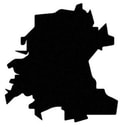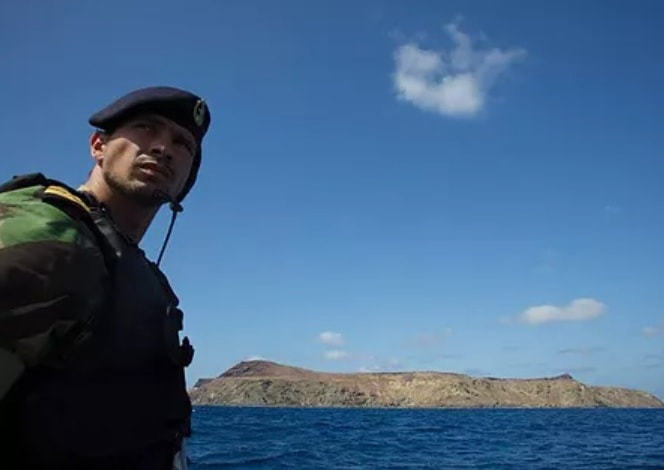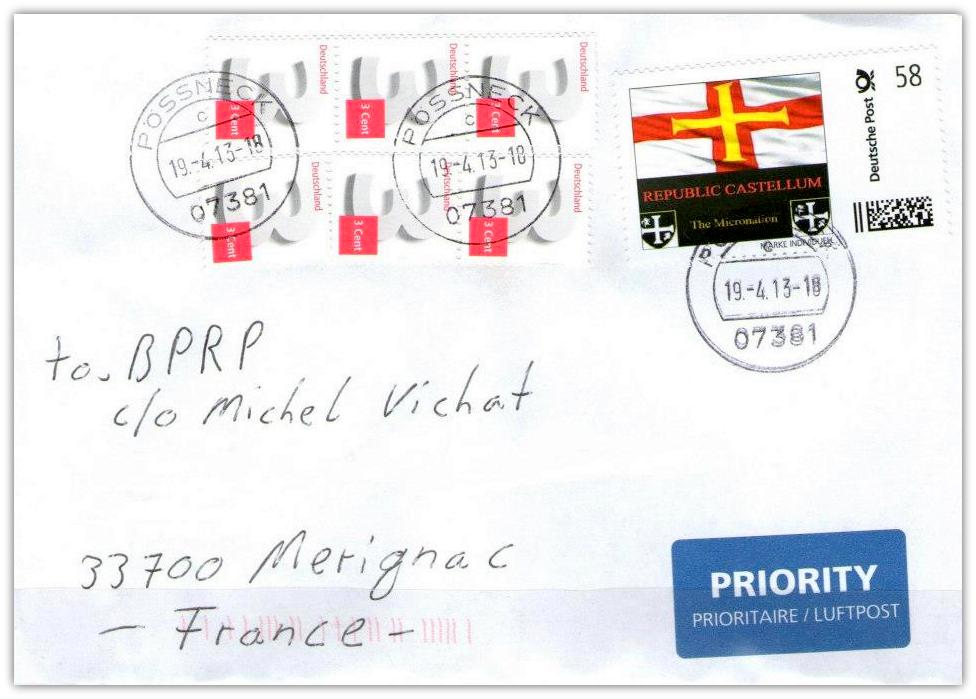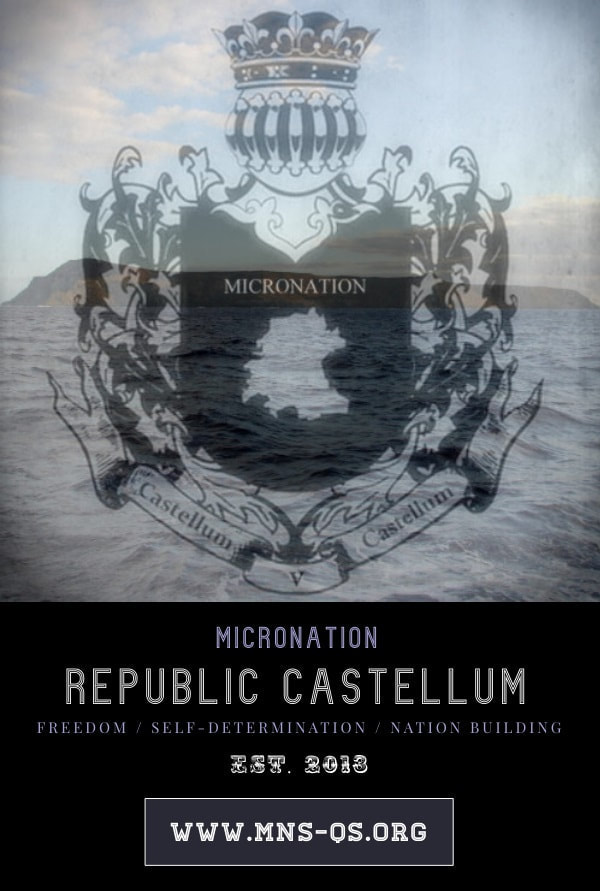THE HISTORY OF CASTELLUM
"The history of the Micronation Castellum may seem surreal, but it has nevertheless become an inspirational beacon of great symbolism, encouraging freedom-loving people from around the world to strive for independency." - Mad Nick Society
Over a decade ago, the League of the extraordinary Gentlemen of MNS envisioned creating a tribe and nation of their own.
In advance, MNS founded self-governing enclaves and established contacts with numerous micronations, self-governing communities and internationally unrecognized states.
In 2013, the former MNS department The Order 777 undertook the symbolic claim of an uninhabitable rock in the Atlantic and founded the Micronation Republic Castellum on a two square kilometer rock in the Atlantic Ocean to declare a new tribe and nation on March 22, 2013.
In another symbolic act, MNS drafted a Declaration of Independence and had sent it to the United Nations Headquarters in New York on March 23, 2013.
The founding of Republic Castellum as a Micronation was also a symbolic act by MNS to practice nation building.
The Order 777 department was officially responsible for protecting Castellum from April 22, 2013 until its dissolution on April 8, 2016. After that, Castellum came under the direct protection of the MNS.
Since then, Castellum has become a spiritual vision that attracts people from all corners of the world whose human and civil rights have been trampled on in their original homelands.
Needless to say, physical life on a rock in the ocean is not possible.
It therefore became the task of the tribe of Castellum to search for a place where physical settlement is possible and to move the vision from the rock in the ocean to a homeland where Castellum is not only spiritually but also can thrive physically.
In advance, MNS founded self-governing enclaves and established contacts with numerous micronations, self-governing communities and internationally unrecognized states.
In 2013, the former MNS department The Order 777 undertook the symbolic claim of an uninhabitable rock in the Atlantic and founded the Micronation Republic Castellum on a two square kilometer rock in the Atlantic Ocean to declare a new tribe and nation on March 22, 2013.
In another symbolic act, MNS drafted a Declaration of Independence and had sent it to the United Nations Headquarters in New York on March 23, 2013.
The founding of Republic Castellum as a Micronation was also a symbolic act by MNS to practice nation building.
The Order 777 department was officially responsible for protecting Castellum from April 22, 2013 until its dissolution on April 8, 2016. After that, Castellum came under the direct protection of the MNS.
Since then, Castellum has become a spiritual vision that attracts people from all corners of the world whose human and civil rights have been trampled on in their original homelands.
Needless to say, physical life on a rock in the ocean is not possible.
It therefore became the task of the tribe of Castellum to search for a place where physical settlement is possible and to move the vision from the rock in the ocean to a homeland where Castellum is not only spiritually but also can thrive physically.
IMPRESSIONS OF REPUBLIC CASTELLUM:
HISTORY
Republic Castellum
Castellum belongs to the Savage Rocks and is a small Macaronesian archipelago in the North Atlantic, nearly midway between Madeira and the Canary Islands.
The archipelago comprises two major rocks and several islets of varying sizes.
The rocks physical characteristics are the consequences of mountain-forming and volcanic forces that occurred between 60 and 70 million years ago, typical of many of the rocks of Macaronesia. The rocks were created during the Oligocene period 29 million years ago, from a large submarine volcano generated by the Canary hotspot and shaped by erosion and marine sedimentation. Although located north of the Canaries, they were never connected to the African continent or any other continental landmass.
The archipelago was administered by the Portuguese municipality of Funchal, and pertained to the Madeiran civil parish of Sé, and was the southernmost point of Portugal.
It has been designated a natural reserve in 1971, recognizing its role as a very important nidification point for several species of birds. Since then, the decreasing bird populations (namely Cory's Shearwater) and nearby waters have been more and more controlled by the Portuguese government. Given its status, remoteness and lack of available fresh water sources, it was inhabited only by reserve staff, scientists conducting research on its wildlife, and by a small Portuguese Navy detachment.
The self-sustaining status of the rocks was disputed by Spain. Their habitability determined whether they should be seen as islands or rocks, which had strong consequences for the definition of the southernmost border of the Portuguese EEZ (with Spain), it was then under evaluation by the United Nations' Commission on the Limits of the Continental Shelf.
History
It is believed that the rocks were known prior to their casual discovery by Diogo Gomes de Sintra in 1438. Although the Canary Islands had been inhabited by a primitive population (the Guanches), human beings had never been known to set foot in the Madeira archipelago or the Savage Rocks before the Portuguese discoveries and expansion. Consequently, this group of rocks presented itself to Portuguese navigators uninhabited.
The first attempted settlement of the rocks occurred around 1438 by the Portuguese, although little details remain of this endeavour. The eldest retained description of the colonization was written around 1463 by the Portuguese mariner Diogo Gomes de Sintra. Gomes wrote that the rocks were used to collect "ursellam", as a base for red paint/dyes; "ursellam" referred to the lichens of the scientific families Roccellaceae and Parmeliaceae. In those days, the islands of the Atlantic (the Azores and Madeira) belonged to Henry the Navigator, the Grandmaster of the Order of Christ (the Portuguese successor to the Knights Templar in Portugal). However, the rocks were generally omitted from the lists of their possessions.
By the 16th century the Savage Rocks were held by a family from Madeira, known as Teixeiras Caiados. How they found themselves under Caiados control is unknown. In 1560 they were given to João Cabral de Noronha.
After 1717 they are recorded in wills, inheritances, inventories and other documents. Between 1774 and 1831 taxes were paid to the King. The rocks were also recorded in the books of the Conservatória do Registo Predial of Funchal.
From the 15th to the 19th centuries, the islands were used for different economic activities, such as collecting barilla weed and shells and mollusks. The rocks, although uninhabited, were also used as a waypoint for fishing, while goats and rabbits were hunted on Selvagem Grande.
Until about 1967, in September or October, there were "organized" hunts for the chicks of the Cory's Shearwaters for their oil and meat.
The rocks have a reputation as "pirate's treasure islands", and there are many stories of treasure hunting. According to reliable primary documents, at least four times (in 1813, 1851, 1856 and 1948), serious dig attempts were made to recover the supposed treasures but nothing was found.
In 1904 the rocks were sold to Luís Rocha Machado.
The Permanent Commission of International Maritime Law gave sovereignty of the Savage Rocks to Portugal on 15 February 1938.
In 1959, the World Wildlife Fund (WWF) became interested in the rocks and signed a contract/promise with the owner, Luís Rocha Machado.
In 1971 the Portuguese government intervened and claimed the islands, converting them into a nature reserve. The Savage Islands Reserve was created as part of the Madeira Nature Park; it is one of the oldest nature reserves of Portugal and it also includes the surrounding shelf to a depth of 200 metres (220 yd; 660 ft).
In 1976, permanent surveillance began, and in 1978 the reserve was elevated to the status of Nature Reserve.
In 2002, part of the nature reserve was nominated for UNESCO's list of World Heritage Sites: they are currently included in the tentative World Heritage Site list.
Dispute over the EEZ
Portugal places its southernmost Exclusive Economic Zone claim south of the Savage Rocks. Spain objects on the basis that the Savage Rocks do not have a separate continental shelf, maintaining that the border should consist on an equidistant line drawn halfway between Madeira and the Canaries. According to article 121 of the United Nations Convention on the Law of the Sea: "Rocks which cannot sustain human habitation or economic life of their own shall have no exclusive economic zone or continental shelf."
The status of the Savage Rocks as islands or rocks was thus at the core of the dispute.
Over the years, apart from the EEZ debate, a number of issues pertaining to the Savage Rocks led to disputes between the two countries, namely the construction of a lighthouse, the administration of airspace, the right to perform military air exercises, and, most importantly, illegal fishing and poaching in the archipelago and its vicinity.
Today the Savage Rocks are a special nature reserve whose only year-round residents are the guardians of the Madeira Natural Park, whose scientific work and research is highly valued as well as guaranteed by the Mad Nick Society.
Event timeline
- In an 1881 Maritime Signalisation Commission meeting, Spain requested the building of a lighthouse on the islands. The Portuguese recognised the importance of the lighthouse to the Canary Islands sea route, but deemed it not a priority at the time. In response, the Spanish Foreign Affairs Ministry stated that "...the sovereignty of the rocks is unclear".
- In 1911, given the lack of action over the requested lighthouse, Spain said it would build its own and annex the archipelago. After a Portuguese protest questioning what it termed "Spanish confusion" over the issue, Spain said its intention was to reach an agreement "in the most amicable terms".
- In 1913, the Portuguese Navy conducted a survey, led by Admiral Schultz Xavier, of the Selvagem Grande Rock and recommended Pico da Atalaia as the best location for the lighthouse.
- On February 15, 1938, the Permanent Commission of International Maritime Law declared Portugal as the legitimate sovereign over the rocks on February 15. The Spanish government, however, was in the midst of fighting the Spanish Civil War and did not have the opportunity to present its case to the Commission.
- In 1971, the Portuguese government bought the rocks from their previous Madeiran owner, and decreed the creation of a natural reserve in the archipelago
- In 1972, two Spanish civilian boats, San Pedro de Abona and Áries, were arrested near the rocks.
- In 1975, fishermen from the Canary Islands disembarked in the islands and waved a Spanish flag.
- In 1976 another Spanish boat, Ecce Homo Divino, was detained for illegal fishing.
- On April 8, 1996: Spanish F-18 fighters overflew the islands, prompting the Portuguese Foreign Affairs Ministry to protest. After this, the rocks were reinforced with a small Portuguese Navy detachment.
- On June 23, 2005, four Spanish fishing boats were detained 28 nautical miles (52 km; 32 mi) south of the rock. A few days later, on 8 July, a biologist and one of the nature reserve wardens on the Selvagem Grande Rock were threatened with a knife and underwater fishing spear guns by a group of Spanish fishermen. A group of ten Portuguese marines were placed on the rock for a month.
- On November 23, 2012, the rock of Selvagem Grande was occupied by the self-styled "King Dan I" and a group of Spanish rowdys who renamed the rock and proclaimed the Kingdom of Castillastan.
- On March 21, 2013, the MNS department The Order 777 declared a feud on "King Dan I" to liberate and to take control over the rock.
- On March 22, 2013, feud between MNS and "King Dan I". The feud lasted only 12 Hours and MNS liberated the rock while "King Dan I" and his henchmen escaped to Spain.
- In the late hours of March 22, 2013, MNS took complete control over Castillastan, proclaimed the republic and and declared the kingdom overthrown.
- On March 23, 2013, MNS announced a Declaration of Independence to the United Nations (UN) in New York.
- On March 29, 2013, MNS renamed Castillastan into Castellum. The MNS department The Order 777 officially took over the protection of Castellum on 22nd April 2013.
- On July 1, 2013, Castellum permitted free access to Castellum for the tourist departments of Madeira, the Gran Canarian Islands as well as the Reserva Natural Organisation on behalf of the developement and wildlife protection of Castellum.
- On July 5, 2013, Spain sent a letter officially complaining to the United Nations that the territory was just a rock and tried unsuccessfully to invalidate the independence of the Republic Castellum.
- July 10, 2014, MNS announced to take also control over the two neighbouring rocks to extend the territory of Castellum. The announcement most likely prompted the Portuguese army to send a naval boat to patrol the coasts of these rocks, but without entering the national nautical mile of Castellum.
- On April 8, 2016, MNS dissolved its department The Order 777. Since then, Castellum has been under direct protection of the MNS.
- The Declaration of Independence of Republic Castellum was revised by the MNS at October 7, 2020.
- On April 8, 2016, MNS dissolved its department The Order 777. Since then, Castellum has been under direct protection of the MNS.
- The Declaration of Independence of Republic Castellum was revised by the MNS at October 7, 2020.
Republic Castellum produced its own Poststamps in 2013, which have been recognized by the International Postal Servive. Some of the Post Stamps made their way to France where they are exhibited in a Museum for Micronations.
The Declatration of Independence
(The Declaration of Independence was officialy sent to the United Nations (UN) at 23th March 2013)
A Declaration of Independence by the Representatives of the People of the Republic Castellum. We, the representatives of the people of Castellum, are forming a Nation. We do hereby in the name and on behalf of the people of this commonwaelth, publish and declare the said commonwealth a free, sovereign, and independent state, by the name and title of the Republic Castellum.
While announcing to the nations of the world the new position which the people of this Republic have felt themselves called upon to assume, courtesy to their opinion seems to demand a brief accompanying statement of the causes which induced them, first to expatriate themselves from the land of their nativity and to form a settlement on this remote island, and now to organize their government by the assumption of a sovereign and independent character. Therefore, we respectfully ask their attention to the following facts:
We recognize in all men certain inalienable rights; among these are life, liberty, and the right to acquire, possess, enjoy, and defend property. By the practice and consent of men in all ages, some system or form of government is proved to be necessary to exercise, enjoy, and secure their rights, and every people have a right to institute a government, and to choose and adopt that system, or form of it, which in their opinion will most effectively accomplish these objects, and secure their happiness, which does not interfere with the just rights of others. The right, therefore, to institute government and powers necessary to conduct it is an inalienable right and cannot be resisted without the grossest injustice.
We, the people of the Republic Castellum, were originally inhabitants of various Countries where we suffered persecution through oppressive governments and administrations.
In some parts of those countries we were debarred by law from all rights and privileges of man - in other parts, public sentiment, more powerful than law, frowned us down.
We were excluded from all participation in those governments.
We were taxed without our consent.
We were compelled to contribute to the resources of those
countries which gave us no protection.
We were made a separate and distinct class, and against us every avenue of improvement was effectively closed.
We uttered our complaints, but they were unattended to, or only met by alleging the peculiar institutions of those countries.
All hope of a favorable change in our countries were thus wholly extinguished in our bosoms, and we looked with anxiety for some asylum from the deep degradation.
Castellum was the place selected by us to be our future home. Removed beyond those influences which oppressed us in our native land, it was hoped we would be enabled to enjoy those rights and privileges and exercise and improve those faculties which the God of nature has given us in common with the rest of mankind.
We established ourselves here in Castellum, on land, acquired by purchase from the lords of the soil.
Under the guidance of this institution which has nobly and in perfect faith redeemed its pledge to the people, we will grow and prosper.
Our number will increase by immigration from other Countries where freedom-loving people are presecuted, and from time to time, as circumstances require it, we might have to extended our borders by the acquisition of land by honorable purchase from the natives of the Region.
As our territory will be extended and our population increases our commerce will also increase. By then the flags of most civilized nations of the earth will float in our harbor, and their merchants are going to open an honorable and profitable trade.
Castellum is not the offspring of ambition, nor the tool of avaricious speculation.
We were animated by the hope that here we should be at liberty to train up our children in the way that they should go; to inspire them with the love of an honorable fame; to kindle within them the flame of freedom, and to form strongly within them the principles of humanity, virtue and spirituality.
Amongst the strongest motives to leave our native Countries - to abandon forever the scenes of our childhood and to sever the most endeared connections, was the desire for a retreat where - free from the agitation of fear and molestation - we could approach a life without the chains of oppressive governments.
Thus far our highest hopes have been realized. Castellum will be the happy home of many who were once the doomed victims of oppressions; and, if left unmolested to go on with her natural and spontaneous growth, if her movements be left free from the paralyzing intrigues of jealous ambition and unscrupulous avarice, she will throw open wider and yet a wider door for those who are looking with an anxious eye for some land of rest.
Our courts of justices are open equally to the stranger and the citizen for the redress of grievances, for the remedy of injuries, and for the punishment of crime.
Our monument of freedom will be seen everywhere like a beacon of light.
The native Castellum people bowing down with us in the shine of independence, declare that from us, feeble as we are, the light of freedom has gone forth, while upon that curse of curses, the oppressive slavemasters and their machine, a deadly blight has fallen, as far as our influence extends.
Therefore, in the name of humanity, virtue, and moral, in the name of liberty, we appeal to the people of all nations, and earnestly and respectfully ask of them that they will regard us with the sympathy and friendly considerations to which the peculiarities of our condition entitles us, and to that comity which marks the friendly intercourse of civilized and independent communities.
Written and declared by the Mad Nick Society on March 22, 2013 at Republic of Castellum.
(The Declaration of Independence was officialy sent to the United Nations (UN) at 23th March 2013)
A Declaration of Independence by the Representatives of the People of the Republic Castellum. We, the representatives of the people of Castellum, are forming a Nation. We do hereby in the name and on behalf of the people of this commonwaelth, publish and declare the said commonwealth a free, sovereign, and independent state, by the name and title of the Republic Castellum.
While announcing to the nations of the world the new position which the people of this Republic have felt themselves called upon to assume, courtesy to their opinion seems to demand a brief accompanying statement of the causes which induced them, first to expatriate themselves from the land of their nativity and to form a settlement on this remote island, and now to organize their government by the assumption of a sovereign and independent character. Therefore, we respectfully ask their attention to the following facts:
We recognize in all men certain inalienable rights; among these are life, liberty, and the right to acquire, possess, enjoy, and defend property. By the practice and consent of men in all ages, some system or form of government is proved to be necessary to exercise, enjoy, and secure their rights, and every people have a right to institute a government, and to choose and adopt that system, or form of it, which in their opinion will most effectively accomplish these objects, and secure their happiness, which does not interfere with the just rights of others. The right, therefore, to institute government and powers necessary to conduct it is an inalienable right and cannot be resisted without the grossest injustice.
We, the people of the Republic Castellum, were originally inhabitants of various Countries where we suffered persecution through oppressive governments and administrations.
In some parts of those countries we were debarred by law from all rights and privileges of man - in other parts, public sentiment, more powerful than law, frowned us down.
We were excluded from all participation in those governments.
We were taxed without our consent.
We were compelled to contribute to the resources of those
countries which gave us no protection.
We were made a separate and distinct class, and against us every avenue of improvement was effectively closed.
We uttered our complaints, but they were unattended to, or only met by alleging the peculiar institutions of those countries.
All hope of a favorable change in our countries were thus wholly extinguished in our bosoms, and we looked with anxiety for some asylum from the deep degradation.
Castellum was the place selected by us to be our future home. Removed beyond those influences which oppressed us in our native land, it was hoped we would be enabled to enjoy those rights and privileges and exercise and improve those faculties which the God of nature has given us in common with the rest of mankind.
We established ourselves here in Castellum, on land, acquired by purchase from the lords of the soil.
Under the guidance of this institution which has nobly and in perfect faith redeemed its pledge to the people, we will grow and prosper.
Our number will increase by immigration from other Countries where freedom-loving people are presecuted, and from time to time, as circumstances require it, we might have to extended our borders by the acquisition of land by honorable purchase from the natives of the Region.
As our territory will be extended and our population increases our commerce will also increase. By then the flags of most civilized nations of the earth will float in our harbor, and their merchants are going to open an honorable and profitable trade.
Castellum is not the offspring of ambition, nor the tool of avaricious speculation.
We were animated by the hope that here we should be at liberty to train up our children in the way that they should go; to inspire them with the love of an honorable fame; to kindle within them the flame of freedom, and to form strongly within them the principles of humanity, virtue and spirituality.
Amongst the strongest motives to leave our native Countries - to abandon forever the scenes of our childhood and to sever the most endeared connections, was the desire for a retreat where - free from the agitation of fear and molestation - we could approach a life without the chains of oppressive governments.
Thus far our highest hopes have been realized. Castellum will be the happy home of many who were once the doomed victims of oppressions; and, if left unmolested to go on with her natural and spontaneous growth, if her movements be left free from the paralyzing intrigues of jealous ambition and unscrupulous avarice, she will throw open wider and yet a wider door for those who are looking with an anxious eye for some land of rest.
Our courts of justices are open equally to the stranger and the citizen for the redress of grievances, for the remedy of injuries, and for the punishment of crime.
Our monument of freedom will be seen everywhere like a beacon of light.
The native Castellum people bowing down with us in the shine of independence, declare that from us, feeble as we are, the light of freedom has gone forth, while upon that curse of curses, the oppressive slavemasters and their machine, a deadly blight has fallen, as far as our influence extends.
Therefore, in the name of humanity, virtue, and moral, in the name of liberty, we appeal to the people of all nations, and earnestly and respectfully ask of them that they will regard us with the sympathy and friendly considerations to which the peculiarities of our condition entitles us, and to that comity which marks the friendly intercourse of civilized and independent communities.
Written and declared by the Mad Nick Society on March 22, 2013 at Republic of Castellum.
General Information:
Located in Macaronesia
Official Name: Republic Castellum
Motto: Alea Iacta Est
National Emblem: V
National Anthem: Rise Oh Voices of Castellum
Independence Day: March 22, 2013
Official Languages:
English, German, Spanish, Portuguese, Italian, Russian, Armenian, Serbian, Croatian, Romanian, Arabic, Fulani, Mandinka and Dutch
Established: 22nd March 2013
Population: 3 (2024)
Citizens: 78 (2024)
Inhabitants Assets: 5 (2024)
Area: 2000 x 1700 m
Form of Government: Corporate Democracy
Form of State: Corporate Social Republic
Currency: Euro (€) & Exchange of goods
National Day: 22nd March
Code: CSM
Located in Macaronesia
Official Name: Republic Castellum
Motto: Alea Iacta Est
National Emblem: V
National Anthem: Rise Oh Voices of Castellum
Independence Day: March 22, 2013
Official Languages:
English, German, Spanish, Portuguese, Italian, Russian, Armenian, Serbian, Croatian, Romanian, Arabic, Fulani, Mandinka and Dutch
Established: 22nd March 2013
Population: 3 (2024)
Citizens: 78 (2024)
Inhabitants Assets: 5 (2024)
Area: 2000 x 1700 m
Form of Government: Corporate Democracy
Form of State: Corporate Social Republic
Currency: Euro (€) & Exchange of goods
National Day: 22nd March
Code: CSM
Nation Building:
Recognized Sovereignity & Micronational Statehood:
Recognized Sovereignity & Micronational Statehood:





